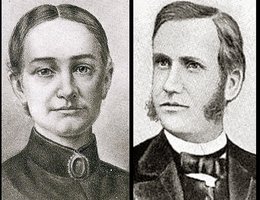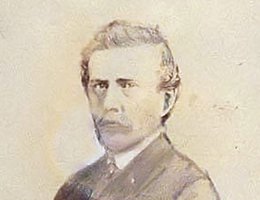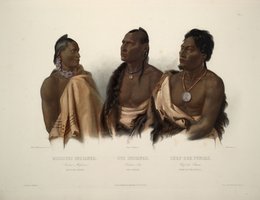
In the 1820s and 1830s, religious groups in the East began to look eagerly toward the lawless and “Godless West”. They decided it was their mission to convert non-believers to their faith. Churches set up "Missionary Societies" or boards to raise money for mission trips. They sent missionaries to the distant corners of the world. The churches saw missionary work as a way to bring both civilization and Christianity to the "savages." It was also a way to lessen the evil influence of the trappers.

What motivated these missionaries? You can get some sense of their purpose by reading the letters of Narcissa Whitman. In 1836 she, her husband Marcus, and Rev. and Mrs. Henry Spaulding traveled through Nebraska on their famous trip to Oregon. They visited with Rev. John Dunbar and the other missionaries around Bellevue. She wrote, "Our visit with him and Brother Merrill’s family was indeed refreshing to our thirsty spirits — kindred spirits rejoicing in the self denials and labors of missionary life." All of these missionaries were intrepid individuals that were inspired to go into the new regions to share their faith.
They were also inspired by a hatred of the dishonesty of some traders and the whiskey that they saw destroying the tribes. Selling whiskey to Indians was illegal, but that didn’t stop many of the traders. Rev. Moses Merrill wrote about one trading post in Nebraska that took a large number of beaver pelts in trade for small amounts of whiskey.
"This is not a house of God, nor the gate of heaven. It is rather the house of Satan and the gate of hell. Two kegs of whiskey were carried from the house this morning by Indians. They will trade their horses, their guns and even their blankets for this poisonous drink."
A Baptist, Rev. Merrill and his wife were the first missionaries to settle in Nebraska in 1833. Missionaries followed them from the Presbyterian, Catholic, Methodist, and Congregational churches. Other missionaries from other denominations followed.

Rev. Moses Merrill, his wife Eliza, Cynthia Brown, and Ira D. Blanchard were sent by the Baptists to Bellevue in 1833. It was an arduous trip, but when they arrived they found that the Oto nation had just signed a treaty with the U.S. that ceded (gave up) land.
In exchange, the tribe were promised yearly cash payments (or annuities), a grist mill, livestock and equipment to help them learn how to farm, and the promise of a government sponsored school. The Merrills were hired to provide the school, thereby augmenting their meager wages from the Baptist Missionary Union.
When Rev. Merrill arrived he began studying the Oto language and eventually translated portions of the Bible and several hymns into Oto. The hymns were printed in a book with the title, "Wdtwhtl Wdwdklha Eva Wdhonetl." Some credit this as the first book published in Nebraska. He also wrote a spelling book and a reader in Oto.

In 1835, Merrill decided he needed to move the school and their mission away from the evil influence of the trading post. They chose a site on the Platte about 8 miles west of Bellevue, the government built them a log cabin and schoolhouse, and about half of the Oto tribe moved close by from their village about 30 miles north near present day Yutan. But the trading continued and the tribe became poorer and poorer. When a couple of children in the school died of diseases, traders spread rumors that teaching children to read would kill them.
Towards the end of the decade, Merrill began following the tribes on their annual hunts and traveling to Shawnee Mission, Kansas (another Baptist settlement) where he could get his books printed on the new press there. These trips were difficult and he contracted tuberculosis in 1839. He died the next year. Eliza Merrill and her young son Samuel were essentially alone after that. She struggled with her fear for their lives and her religious conviction. Eliza and Samuel returned to the East, leaving the school and their work behind. Read more about Indian treaties